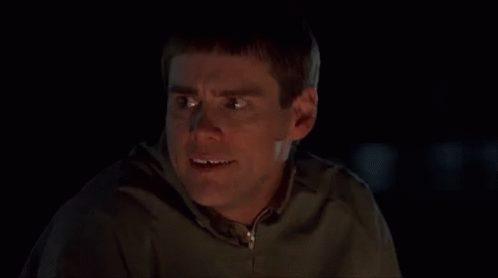The ignorance is appalling.
You are using an out of date browser. It may not display this or other websites correctly.
You should upgrade or use an alternative browser.
You should upgrade or use an alternative browser.
Fed will overshoot rate increases
- Thread starter <SLV>
- Start date
Welcome to the Precious Metals Bug Forums
Welcome to the PMBug forums - a watering hole for folks interested in gold, silver, precious metals, sound money, investing, market and economic news, central bank monetary policies, politics and more.
Why not register an account and join the discussions? When you register an account and log in, you may enjoy additional benefits including no Google ads, market data/charts, access to trade/barter with the community and much more. Registering an account is free - you have nothing to lose!
If you want an idea of how the current fiscal and asset bubble in the US might end, pay close attention to Bernard Connolly, esteemed consigliere to hedge funds and central bankers across the world for the last quarter century.
It will not end in a soft landing – a “chimaera” – and will certainly not end in another leg of accelerating economic growth. Nor will it end in soggy stagflation.
The invidious choice facing the Federal Reserve, he warns, is either to allow a deep economic slump to unfold, or slash rates to the bone before inflation has fallen back to target. The latter course will send the dollar into free fall and destabilise the world’s dollarised financial system, an outcome already being sniffed out by the reawakening gold market.
...
“There can be little doubt that there will be a US recession unless the Fed loosens hard and soon. The labour market is weakening and ‘excess savings’ from the pandemic-era handouts are exhausted,” he said.
“The likeliest near-term outcome is that, as in 2000 and 2007, the Fed holds off cutting interest rates just yet, citing worries that inflation is not convincingly and sustainably moving to target. By mid-year the weakening of the economy will have become evident even to the Fed’s modellers. But they will not cut far enough or fast enough,” he said.
...
This points to an initial rate cut in June, followed by cascading cuts in rapid succession, though still too little, too late. The Fed Board is already preparing for a hand-brake U-turn. Governor Adriana Kugler recently reminded everybody that the Fed has a “dual mandate”: jobs as well as inflation.
Days earlier, New York Fed chief John Williams said the supply-side shock of the pandemic had blown over and that US inflation had carved out a near perfect round trip, “like the Apollo missions to the moon and back.” He said three-year inflation expectations are now below their 2014-2019 average. This is a Fed preparing its alibi.
As I wrote last week, the US economy has lost a net 900,000 workers since November, based on the US household survey. This has lifted unemployment from 3.4pc to 3.9pc. The jump is close to triggering the Fed’s ‘Sahm Rule’ recession indicator.
The US economy is not as strong as widely assumed. The latest US financial accounts show that gross domestic income (GDI) grew by just 1.2pc last year. This measure has been consistently weaker over recent quarters than the GDP figure, which ought to give pause for thought.
A Fed study found that GDI is more accurate when the economy rolls over. It foretold a recession in 2007 at a time when the GDP figures (revised down later) were still signalling clear blue sky.
...
The Wicksellian theme running through Mr Connolly’s book is that central banks have created a chronic ‘intertemporal’ misalignment in the western economies, starting with Alan Greenspan in the 1990s.
They have let asset booms run unchecked but have always stepped in to prevent the economy coming back into balance during downturns. But you cannot pull consumption from the future forever without consequences. The future catches up with you.
“The real difficulty with the Greenspan maxim – that a problem deferred is a problem solved – is that you have to keep on deferring, via ever-bigger bubbles that ultimately threaten to destroy both capitalism and democracy,” he said. Furthermore, this reflex obstructs the Schumpeterian cleansing process of creative destruction.
As Joe Biden’s budget boom deflates this year it will become clear that the US economy cannot handle interest rates anywhere near the current level of 5.33pc. America and the West will discover that they are on the same conveyor-belt towards “ever-lower real interest rates”, requiring drastic cuts to refloat the next bubble in equities and credit.
My angle is slightly different. Deflation will keep coming back to haunt us with each cycle – requiring zero rates and crazy money – because of ageing demographics, digital technology, and above all the Asian saving glut.
The cardinal fact is that China produces 31pc of global manufactured goods but accounts for 13pc of total consumption. Xi Jinping’s regime is dumping massive excess capacity on the rest of us. It is reverting to the worst practices of Leninist capitalism. This is the elephant in the global rowing boat.
Whether Mr Connolly is right or savings glut theorists are right, both imply a secular collapse in the natural rate of interest and the subversion of western free market system.
The central banks and the academic priesthood are floundering because their canonical DSGE model – new neoclassical synthesis – assumes that the economy comes back into equilibrium when it patently does no such thing. The model is self-evidently defective but all other voices – Wicksellian, monetarist, Austrian, or old Keynesian – have been shut out of the debate.
The priests were badly wrong in 2007-2008. We will find out who is badly wrong this year soon enough.
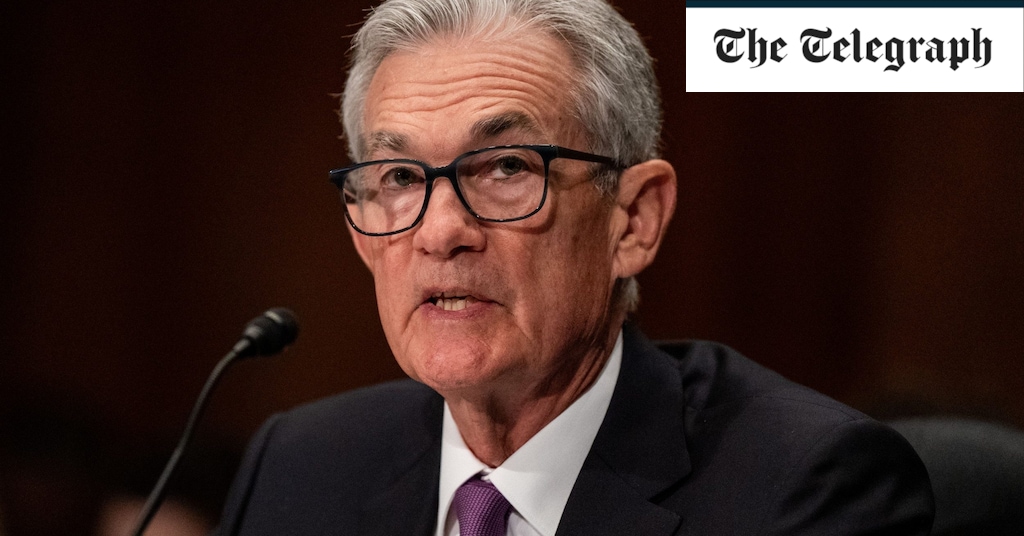
The Federal Reserve is preparing for a hand-brake U-turn on interest rates
US economy’s ability to reset itself when imbalanced is being stunted by interventions
- Messages
- 36,925
- Reaction score
- 6,348
- Points
- 288
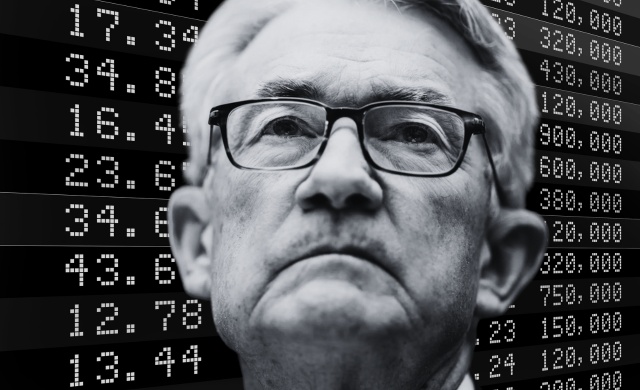
U.S. Index Futures Trade Sideways Amid Anticipation of Fed’s Policy Update; Oil Prices Dip
In Wednesday’s pre-market trading, U.S. index futures were trading sideways, reflecting investors’ caution after a positive session, with focus turning to the upcoming Federal Reserve monetary policy update. As of 6:31 AM, Dow Jones futures (DOWI:DJI) were down 31 points, or -0.08%. S&P 500...
- Messages
- 36,925
- Reaction score
- 6,348
- Points
- 288
Fed holds rates steady but indicates three cuts coming sometime this year
The Federal Reserve on Wednesday held interest rates steady as expected but signaled that it still plans multiple cuts before the end of the year.Following its two-day policy meeting, the central bank’s rate-setting Federal Open Market Committee said it will keep its benchmark overnight borrowing rate in a range between 5.25%-5.5%, where it has held since July 2023.
Along with the decision, Fed officials penciled in three quarter-percentage point cuts by the end of 2024, which would be the first reductions since the early days of the Covid pandemic in March 2020.
More:
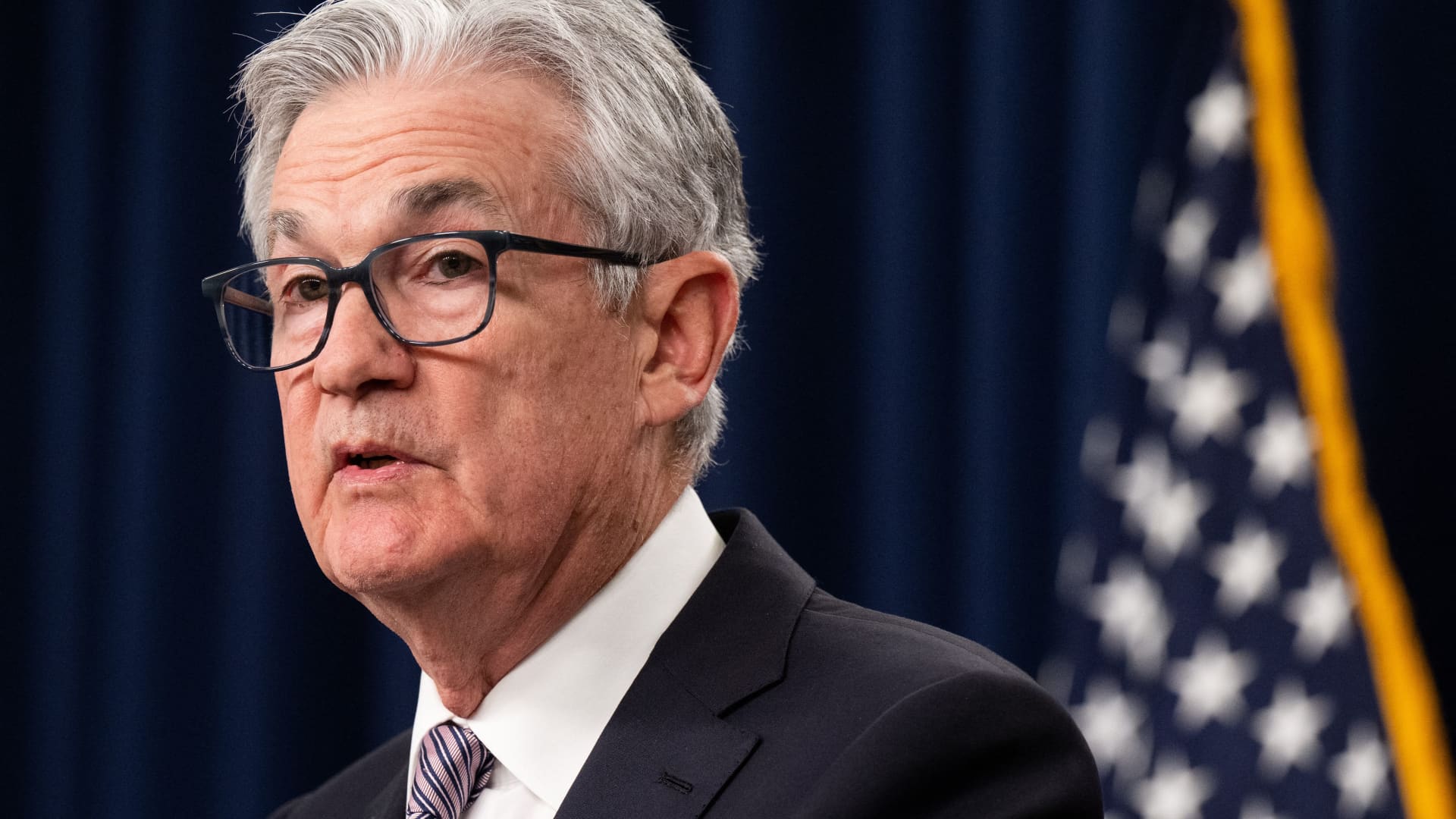
Fed holds rates steady but indicates three cuts coming sometime this year
The Federal Reserve on Wednesday released its decision on interest rates following its two-day policy meeting.
If the economy is doing so well, as he asserts that it is, why is there any talk/expectations of lowering rates? If the economy is so great, it stands to reason that the economy can bear the current interest rate.
In my lifetime, I cannot recall them lowering rates during good economic times. That only seemed to happen when economic trouble becomes apparent. So why now?
In my lifetime, I cannot recall them lowering rates during good economic times. That only seemed to happen when economic trouble becomes apparent. So why now?
Because they're lying, nonstop.
Truth and Government, are two words that never go together; but neither have we endured such a constant, nonstop barrage of transparent, intelligence-insulting LIES.
Not until now.
Truth and Government, are two words that never go together; but neither have we endured such a constant, nonstop barrage of transparent, intelligence-insulting LIES.
Not until now.
Well yea, so why can't everyone see that? Anyone old enough to give a fuck about the fed and their interest rate, is old enough to realize that what I posted is objectively true.Because they're lying, nonstop.
We actually have. You've simply come to be able to see it for what it is. Plenty of dirty dealings and lies have been going on for longer than either of us have been alive.Truth and Government, are two words that never go together; but neither have we endured such a constant, nonstop barrage of transparent, intelligence-insulting LIES.
Not until now.
.....but it has gotten more visible, especially over the past 8 years thanks to the turmoil caused by the dems insane reaction to Trump beating their hag. A lot of eyes have been opened that would have remained blissfully closed had the wretched hag somehow pulled out a victory.
On a side note, could ya even imagine how fucked things would be had that happened? I shudder to even think about it. At the least, we'd have a SC with four new Justices like this last abomination instead of just one. There's been several favorable rulings thanks to the new Court that, had the hag won, would have all gone hard the other way.
It's alao gotten harder to conceal contain and control what gets out, and the image presented for public consumption. Never used to have so many "citizen journalists" with a Twitter account standing ready to go viral.
- Messages
- 36,925
- Reaction score
- 6,348
- Points
- 288
The great central bank policy reversal kicks off
- Swiss kick off rate cuts among major central banks
- ECB likely to follow in June
- BoE, Fed to come next before the summer is over
- Inflation is on downward trend but not yet extinguished
There will be no floodgates or fireworks. Instead, banks on opposite sides of the Atlantic are likely to move in the smallest increments with periodic pauses, fearing that ultra-low unemployment could rekindle inflation rates still above their targets.
The eventual bottom for interest rates is also set to be far higher than the historic lows of the last decade and mega-shifts in the structure of the global economy could put borrowing costs on a higher path for years to come.
Central banks started to jack up rates from late 2021 as post-pandemic supply constraints and surging energy prices on Russia's war in Ukraine sent inflation into double-digit territory across much of the world.
More:
Stubbornly high inflation could push the Federal Reserve into a more cautious stance this year regarding interest rate cuts, the central bank's former vice chair said Friday.
Richard Clarida, who served as Fed governor until January 2022 and is now a global economic advisor at asset management giant Pimco, said his former colleagues need to be on guard against sticky prices that could thwart plans to ease monetary policy this year.
At its meeting earlier this week, the rate-setting Federal Open Market Committee indicated it would likely decrease rates three times this year, assuming quarter percentage point intervals. Chair Jerome Powell said receding inflation and a strong economy give policymakers room to cut.
"This may be more of a hope than a forecast," Clarida said during an interview on CNBC's "Squawk Box." "I do hope that the Fed really moves into data-dependent mode, because there can be a very good case if inflation is sticky and stubborn that they shouldn't deliver three cuts this year."
...
- Messages
- 562
- Reaction score
- 732
- Points
- 283
What they say is more important than what they do.
From post #242:
Related:
More:
https://www.msn.com/en-us/money/oth...-here-s-why-she-s-getting-worried/ar-BB1kzQ16
...
As I wrote last week, the US economy has lost a net 900,000 workers since November, based on the US household survey. This has lifted unemployment from 3.4pc to 3.9pc. The jump is close to triggering the Fed’s ‘Sahm Rule’ recession indicator.
...
Related:
Closely followed measures of U.S. inflation have come in hotter than expected so far this year, and economist Claudia Sahm is getting nervous: A recent batch of economic reports implies that pricing pressures aren’t abating steadily, which could give the Federal Reserve an excuse for what she views as “foot-dragging” on cutting the interest rates that have made mortgages, car loans and credit-card balances more expensive.
“I would really have them take 25 basis points off next week,” Sahm said in mid-March, after the release of the February consumer-price index.
In a series of conversations with MarketWatch over the past month, Sahm said she wants the Fed to ease rates — which are currently in the range of 5.25% to 5.5% — ASAP. She’s not advocating for a dramatic cut but says the Fed needs to get the ball rolling on easing the tight monetary policy it has implemented over the past two years to help cool the economy and quash out-of-control inflation.
Given everything she’s heard from policy makers in recent weeks, Sahm suspects that the first cut might not come until July. The delay raises the risk that the Fed will cut interest rates too late and cause a recession, she said, by leaving a too-restrictive policy in place for too long. ...
More:
https://www.msn.com/en-us/money/oth...-here-s-why-she-s-getting-worried/ar-BB1kzQ16
...
- The personal consumption expenditures price index excluding food and energy increased 2.8% on a 12-month basis and was up 0.3% from a month ago, matching estimates.
- Core PCE was up 0.3% for the month and 2.5% at the 12-month rate, compared to estimates for 0.4% and 2.5%.
- Consumer spending shot up 0.8% on the month, well ahead of the 0.5% estimate. Personal income increased 0.3%, slightly softer than the 0.4% estimate.
“Nothing really super surprising. Obviously not the numbers the Fed wants to see, but I don’t think this is going to catch anybody off guard when they come back to work on Monday,” Victoria Greene, chief investment officer at G Squared Private Wealth, told CNBC. “I think everybody is going to pivot to labor pretty quickly and say well maybe if we see some weakness and cracks over here, this little stickiness in inflation and PCE isn’t going to matter as much.”
...

Key Fed inflation gauge rose 2.8% annually in February, as expected
The core personal consumption expenditures price index was expected to increase 0.3% in February.
Weakness in the labor numbers you say?

(redacted) are rigging employment stats
everything is rigged -- example number 214. chinese-style communism continues under the (redacted) control of nyc/dc not my bold https://www.zerohedge.com/markets/here-comes-job-shock-philadelphia-fed-admits-us-jobs-overstated-least-11-million ... due to the record high rate of estimation -...
We all know that there is a coming "rock, meet hard place" moment coming. At some point, the gov will not be able to afford growing interest costs, and they all know it.Maybe this is a bigger reason to cut rates than just so Joe can get re-elected.
ZeroHedge
ZeroHedge - On a long enough timeline, the survival rate for everyone drops to zerowww.zerohedge.com
San Francisco Federal Reserve President and FOMC member Mary Daly said that she feels no urgency to lower interest rates, and that notwithstanding the central bank’s latest ‘dot plots’, three cuts this year is not guaranteed.
“There is really no urgency to adjust the rate,” Daly said at an event in Las Vegas, Nevada on Tuesday. “Standing pat is the right policy at the moment.”
While she acknowledged that inflation has been coming down it the United States, she characterized the journey as “bumpy and slow.”
Markets have all but abandoned hope of a May cut to the Fed funds rate and are approaching a coin toss for the likelihood of a June cut.
Daly said that while she still sees a path to cut interest rates this year, “we’re just not there yet.”
...
- Messages
- 36,925
- Reaction score
- 6,348
- Points
- 288
Fed’s Powell emphasizes need for more evidence that inflation is easing before cutting rates
Federal Reserve Chairman Jerome Powell said Wednesday it will take a while for policymakers to evaluate the current state of inflation, keeping the timing of potential interest rate cuts uncertain.Speaking specifically about stronger-than-expected price pressures to start the year, the central bank leader said he and his fellow officials are in no rush to ease monetary policy.
“On inflation, it is too soon to say whether the recent readings represent more than just a bump,” Powell said in remarks ahead of a question-and-answer session at Stanford University.
“We do not expect that it will be appropriate to lower our policy rate until we have greater confidence that inflation is moving sustainably down toward 2 percent,” he added. “Given the strength of the economy and progress on inflation so far, we have time to let the incoming data guide our decisions on policy.”
More:
Of course.
Children don't like being told they can't have candy for dinner, either.
This just tells us of the mindset of the money-changers and stonk chasers. Looking for Moar Free. Free money, mindless investing...buy today, watch prices launch, as all the bank algos buy robotically with ZIRP out of the Fed.
That they cannot see that it's come to an end, that it's unsustainable, that it has promoted malinvestment ignoring investment fundamentals...tells you they're simpletons, DEI scholarship stoohdintz.
Children don't like being told they can't have candy for dinner, either.
This just tells us of the mindset of the money-changers and stonk chasers. Looking for Moar Free. Free money, mindless investing...buy today, watch prices launch, as all the bank algos buy robotically with ZIRP out of the Fed.
That they cannot see that it's come to an end, that it's unsustainable, that it has promoted malinvestment ignoring investment fundamentals...tells you they're simpletons, DEI scholarship stoohdintz.
- Messages
- 36,925
- Reaction score
- 6,348
- Points
- 288
- Messages
- 36,925
- Reaction score
- 6,348
- Points
- 288
Survey: Fed will keep interest rates historically high until end of 2026
Rate cuts might not bring the relief consumers have been waiting for.
Federal Reserve Governor Michelle Bowman said Friday that it's possible interest rates may have to move higher to control inflation, rather than the cuts her fellow officials have indicated are likely and that the market is expecting.
Noting a number of potential upside risks to inflation, Bowman said policymakers need to be careful not to ease policy too quickly.
"While it is not my baseline outlook, I continue to see the risk that at a future meeting we may need to increase the policy rate further should progress on inflation stall or even reverse," she said in prepared remarks for a speech to a group of Fed watchers in New York. ...
Fiscal doom loop on aisle 7.
- Messages
- 36,925
- Reaction score
- 6,348
- Points
- 288
CPI Jumps, 10 YR Bond Auction Dumps, BLS gives "Super Users" Non-Public Data
Apr 10, 2024The CPI Report came out hotter than expected reducing interest rate cut expectations for 2024. It has reduced the odds of a June meeting rate cut to only 20%. Along with the Consumer Price Index showing inflation higher than expected, the US 10 Year Note auction tailed when issued stopping at a high yield of 4.560%. The disastrous bond auction could be a sign that foreigners have less interest in US bonds as we recklessly print money and increased our debt by $1 Trillion every 90 days. Foreign bond buyers might be buying gold instead of US bonds.
While inflation is making a comeback, it has been reported that the Bureau of Labor Statistics (BLS) has a list of preferred users like JP Morgan that get information not available to everyone. These "super users" have even gotten nonpublic information that was not available to the general public until two weeks later.
16:45
... it has been reported that the Bureau of Labor Statistics (BLS) has a list of preferred users like JP Morgan that get information not available to everyone. ...
--> https://www.pmbug.com/threads/clarence-beeks-working-for-the-bls.7350/
- Messages
- 36,925
- Reaction score
- 6,348
- Points
- 288
Fed Chair Powell says there has been a ‘lack of further progress’ this year on inflation
- Fed Chair Jerome Powell said the U.S. economy has not seen inflation come back to the central bank’s goal, pointing to the further unlikelihood that interest rate cuts are in the offing anytime soon.
- “The recent data have clearly not given us greater confidence, and instead indicate that it’s likely to take longer than expected to achieve that confidence,” he said during a central banking forum.
Speaking to a policy forum focused on U.S.-Canada economic relations, Powell said that while inflation continues to make its way lower, it hasn’t moved quickly enough, and the current state of policy should remain intact.
“More recent data shows solid growth and continued strength in the labor market, but also a lack of further progress so far this year on returning to our 2% inflation goal,” the Fed chief said during a panel talk.
Echoing recent statements by central bank officials, Powell indicated the current level of policy likely will stay in place until inflation gets closer to target.
More:
...
Fiscal doom loop on aisle 7.
Soaring debt levels threaten to render the Federal Reserve powerless, taking away its ability to fight inflation, warned Tavi Costa, macro strategist at Crescat Capital.
In a recent interview with Jeremy Szafron, Anchor at Kitco News, Costa highlighted the increasing irrelevance of traditional monetary tools like interest rate adjustments in the face of unprecedented fiscal challenges.
Costa remarked on the alarming trajectory of the U.S. national debt, which, according to the U.S. Treasury, recently exceeded $34.5 trillion, emphasizing the gravity of this fiscal challenge. The Congressional Budget Office recently projected that U.S. federal government debt, which was 97% of GDP last year, is projected to rise to 116% by 2034. This projected level would surpass the debt levels experienced during World War II.
"At some point, the debt problem is going to be so large... that will cause the Fed to become almost irrelevant because they can't raise rates. They can't use interest rates as a mechanism to fight inflation," Costa explained. This scenario paints a bleak picture of central banks struggling to exert any meaningful influence over economic stability.
...
I think we might already be there. From what I understand, there is a whole lot of low interest government debt coming due in the next few months and ready to roll over. A big part of the impetus to cut rates is to lower the interest that new/replacement debt issuance is going to incur.
- Messages
- 36,925
- Reaction score
- 6,348
- Points
- 288
Trump's team wants to restructure the Fed and let him have a say on interest rate decisions: WSJ
- Some members of Trump's team want to restructure the Federal Reserve, the WSJ reported.
- That could include allowing the president to have a direct say on interest rate decisions.
- It would also allow him to get rid of Fed Chair Jerome Powell before his term ends in 2026.
The Wall Street Journal reported on Thursday night that members of Trump's team are creating plans that would restructure the Federal Reserve and allow Trump to influence the Fed's actions, according to people familiar — a move that would erode the Fed's independence from political entities.
According to the Journal, the proposals would give Trump a say on interest-rate decisions, along with giving him the authority to oust Fed Chair Jerome Powell from his position before his term is up in 2026.
More:
$8.9 trillion this year, to be exact. That means the gov is going to need to sell in excess of $10 trillion in debt this year.From what I understand, there is a whole lot of low interest government debt coming due in the next few months and ready to roll over.
The title of this thread should have been, "Fed will NOT overshoot rate increases". lol Had they kept hiking rates, and started earlier, they'd be in a position to lower rates ahead of the bidet's reelection bid. Like they were wanting to do.
It was a also a huge mistake last Fall for Powell to have said that they anticipated rate cuts as soon as march. All that did was re-ignite markets that they were trying to tamp down by raising rates to begin with. Stupid stupid stupid!
And the Supreme Court might look a lot different if the bidet and his dem minions get re-elected, because they want to load it with woke commies to help change everything currently good about America.The nation's central bank might look quite different if former President Donald Trump wins the upcoming election.
- Messages
- 36,925
- Reaction score
- 6,348
- Points
- 288
Fed in a holding pattern as inflation delays approach to any soft landing
WASHINGTON, April 29 (Reuters) - Inflation showing no recent sign of slowing or narrowing in scope leaves U.S. Federal Reserve policymakers challenged this week over how to characterize their next steps even as the countdown to a contentious U.S. presidential election continues.The Fed is seen holding its benchmark interest rate steady at 5.25%-to-5.5% at its April 30-May 1 meeting, and a key judgment in the current policy statement - that inflation "remains elevated" - may have to remain in place after the pace of price increases accelerated over the first three months of the year after steadily slowing through 2023.
More:
- Messages
- 36,925
- Reaction score
- 6,348
- Points
- 288
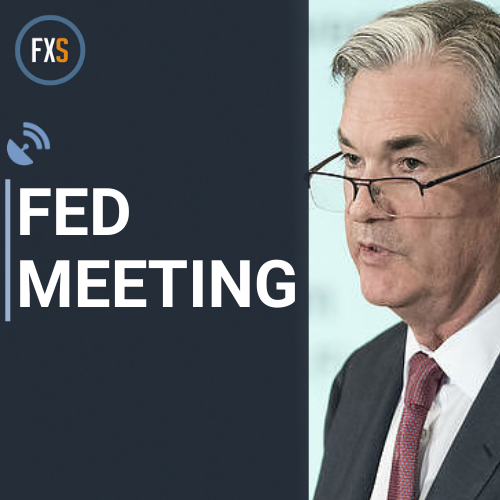
US Fed Preview: Will FOMC continue to postpone interest rate cuts amid sticky inflation?
The US Federal Reserve (Fed) will announce monetary policy decisions following the April 30 - May 1 policy meeting on Wednesday.



